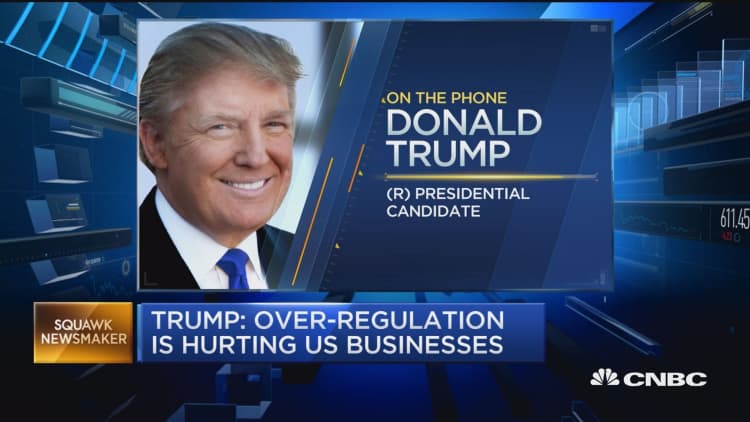
Donald Trump finds himself in a campaign conundrum — he's an anti-debt candidate running on a platform that would substantially increase the American IOU to the world.
In an interview Monday with CNBC, the Republican nominee again railed against the national debt surge under President Barack Obama. Total government debt stood at $10.63 trillion when Obama took office, and has swelled to $19.48 trillion as of last Thursday, according to Treasury figures.
Trump repeatedly has called out the administration for what he says is its free-spending ways, and he amped up that rhetoric during the phone interview.
"In eight years we've doubled what's happened over hundreds of years," he said. "The worst part of doubling the debt is we haven't gotten anything for it."
The trouble with Trump's debt position, though, is that his own proposals, according to virtually every analysis that's been done of his plans should he become president, would increase U.S. debt dramatically.
Among the analyses: the left-leaning Brookings Institution figures debt to increase by $10 trillion, the Committee for a Responsible Federal Budget puts the figure at $11.5 trillion, and Moody's Analytics chief economist Mark Zandi said a $11 trillion Trump increase would accompany a "lengthy recession."
Should Trump get elected, then, and be allowed to implement his agenda, U.S. debt would swell past $30 trillion.
The debt would be generated by a combination of increased infrastructure spending and tax cuts both for individuals and businesses. Trump wants to cut the number of tax brackets from seven to three, reducing rates particularly for middle-income payers, and he would slash business taxes to 15 percent from 35 percent now.
He has said the growth the plan will generate will offset the rise in debt, though many analyses doubt that will happen.
In the CNBC interview, Trump seemed to acknowledge the disparity between being anti-debt and pro-fiscal stimulus.
"We have a country that needs massive investment and at the same time we're at $20 trillion" in debt, he said.
The chances of Trump's spending plans becoming reality are slim. In fact, a growing chorus of Wall Street economists believes either he or Democratic nominee Hillary Clinton will face a gridlock environment in Washington amid the competing interests and party alignments in Congress.


